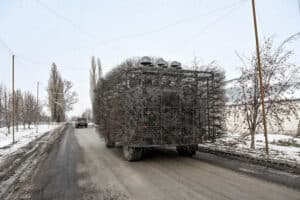Leaders escalate war rhetoric while organising exclusive peace summits, deepening divisions instead of promoting unity.

There is nothing as disturbing as when leaders talk about peace but at the same time intensify their war rhetoric.
What about when leaders organise a peace summit, excluding the other side because they decided it will not be interested in peace?
We have seen a lot of this happening in Europe vis-à-vis the Ukrainian war. Finnish president Alexander Stubb said recently: “We need to talk less about war and prepare for it more.”
ALSO READ: Putin to make ‘friendly’ visit to North Korea
He even acknowledged that the Western rhetoric has become so aggressive that “it can easily undermine the younger generation’s sense of security and faith in the future”.
Recently, European leaders have indeed been breaking all records for the level of aggressiveness of anti-Russian rhetoric.
French President Emmanuel Macron recently announced his readiness to send French troops to Ukraine.
But his proposal did not receive the approval of his colleagues in the European Union, despite the fact that most of them talk about the need for a tough approach with Russia.
Europe, especially the Baltics and the Scandinavian nations, scare themselves in their belief that, after taking control of Ukraine, Moscow will want to occupy them… and even Germany.
Most likely, European leaders see the sending of their troops to Ukraine as declaration of war against Moscow, which is a dangerous path to take.
But their Russophobic rhetoric is needed to achieve political goals: to gain leadership positions within Europe, where leadership is now largely determined by the level of Russophobia and the readiness to at least verbally confront Russia.
ALSO READ: Japan lodges protest over China vessels near disputed islands
That is why Macron is talking about sending troops. German Chancellor Olaf Scholz boasts of second place (after the US) in the West’s ranking in terms of aid to Ukraine, and British Prime Minister Rishi Sunak announced his intention to put the economy on a war footing.
The problem is that these political games of militancy are not backed financially. The Europeans raked out their military reserves during the supply of military equipment to Ukraine and are now complaining that they are running out of missiles, tanks, air defence systems and other equipment.
Second, the European military-industrial complex cannot quickly cover all the resulting shortfalls due to the fact that in a number of countries, the manufacturing capacity is low.
There is no aircraft manufacturing, either, since the pan-European military aviation project is on the verge of closure. Reports say shipbuilding remains, but there simply aren’t enough crews to assemble new ships.
Europeans will now have to buy American equipment en masse to replenish their reserves. European armies will not be ready for war with Russia in the manner that Macron wants.
ALSO READ: Ukraine’s Azov hails US lifting weapons ban
This not to mention the war with the modern “axis of evil”, as Britain’s Rishi Sunak describes the quasi-alliance between Moscow, Tehran, Beijing and Pyongyang.
Therefore, one may ask, quantitatively or technically, or even technologically: must European armies deal with the armed forces of the four “axis of evil”?
One needs to just consider why the West gets worried when China’s Xi Jinping talks, never mind visits, his North Korean counterpart, Kim Jong-un, in order to see what the West thinks about their strength.
This not to mention the fact that the Russian army gained enormous experience during the conflict in Ukraine, as Western agencies and experts themselves acknowledged.
Perhaps Stubb is right: Europe really needs to prepare for war. Not with Russia, but with itself.
Support Local Journalism
Add The Citizen as a Preferred Source on Google and follow us on Google News to see more of our trusted reporting in Google News and Top Stories.






